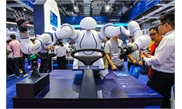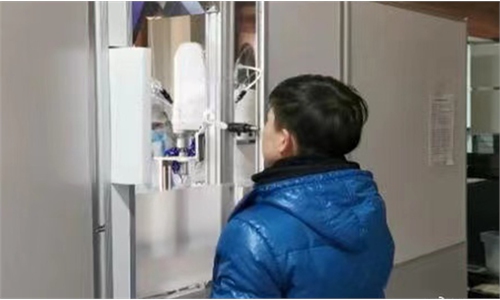
A robo-dog is seen crouching on the ground. Photo: GT/Chu Daye
Cost factors could put China one step ahead of the US in the mass commercialization of multi-legged bionic robots, a senior expert in the field told the Global Times on Tuesday.
Multi-legged robots have gained increasing market attention in China as products similar to US-based Boston Dynamics' quadruped canine-inspired robot begin to emerge.
Notably, Hangzhou-based Unitree Robotics unveiled its first bionic companion robot early in June, priced at $2,700 a piece.
Chung-Ming Own, an associate professor at Tianjin University's College of Intelligence and Computing, said that by bearing cost reductions in mind, China's legged robots could achieve mass commercialization earlier than the US due to Boston Dynamics' focus on the high-end, security applications of such robots.
Own's team works on artificial intelligence that gives a robot-dog the ability to act on its own. One bottleneck would be for the robot to navigate inside a building and climb stairs when necessary. Own uses a quadruped robot-dog developed by DeepRobotics, another Chinese bionic robotics firm, based in Hangzhou.
Multi-legged robots have great potential in the security industry, patrols, disaster relief or even battlefield applications. However, their high cost, driven by sophisticated mechanics and expensive parts, has prevented and delayed their commercialization, making them expensive "pets". The Spot by Hyundai Motor-owned Boston Dynamics, for example, is priced at $74,500.
"After years of catching up, China's development of multi-legged robots has reached roughly the same level as that of the US," Own told the Global Times on Tuesday.
"Despite some shortcomings in the area of motors, Chinese companies' approach, which focuses on civilian uses such as coal mine probes, could actually be an advantage."
Own's team developed a six-footed, spider-shaped robot that boasts the advantages of quadruped robots but at a more affordable price. One of the first real-world applications would be searching a given field for a natural gas leak.
While most of the social media buzz is focused on multi-legged robots' ability to control their movements, such as Spot's dazzling backflips, it is in certain application scenarios that they distinguish themselves with their speed, ability to navigate different terrains, and carry weight from their tract-based or two-legged human-shaped competitors.
"The robots could scout a large area for a gas leak at a fairly quick speed, replacing six humans, and they can work with efficiency 24/7," Own said, referring to the legged robot's advantage.
A price of 100,000 yuan ($15,450) "is the threshold we are driving at, and I believe this is a prerequisite for the robot to be accepted by the civilian market. Patrolling a campus or home could be one of the first uses," said Own.
Chinese internet giant Tencent also unveiled its Max robot-dog that combines legs with wheels as the robot's feet. The robot, which could do backflips, has a speed advantage, at a maximum of 25 kilometers per hour, over pure-leg designs.



